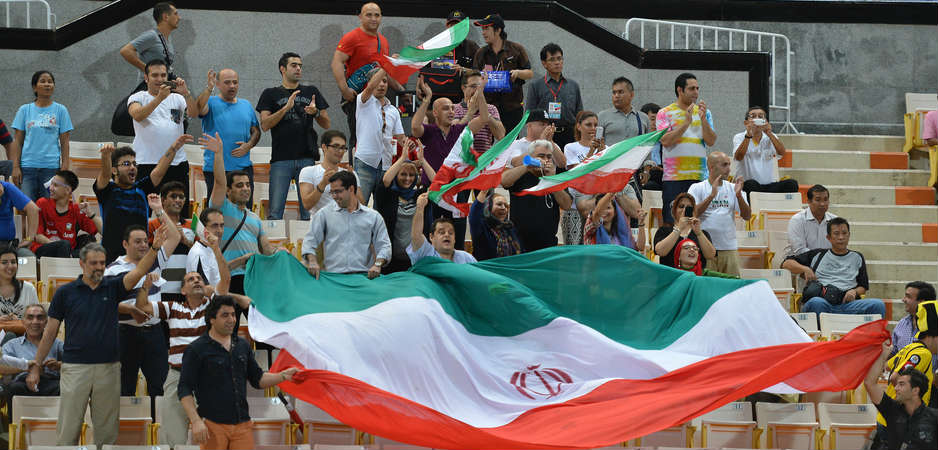Rouhani is likely to benefit from the success of the Iranian soccer team at the World Cup.
It didn’t take long for it to emerge that Iranian President Hassan Rouhani shared an understanding of soccer’s political unity with his predecessor, Mahmoud Ahmadinejad, whose militant and conservative policies he hopes to reverse.
Like Ahmadinejad, Rouhani, a cleric, is seeking to identify himself with the success of his country’s national team that delivered one of its best performance in the FIFA World Cup. Rouhani, who is negotiating with the P5+1 to put an end to the Iranian nuclear crisis, and with Washington over a possible coordination of efforts to stymie jihadist advances in Iraq, could succeed where Ahmadinejad failed.
Hopes are riding high on Rouhani who recently posted a photograph of himself on Twitter relaxing at home in an Iranian team shirt and tracksuit bottoms. The photo, believed to be the first off-duty picture of an Iranian president, was published after Iran narrowly lost a match against Argentina — a badly needed image boost for a nation long seen as one of the world’s pariahs.
By contrast, soccer fans hold Ahmadinejad responsible for tightening the grip of the government and its Revolutionary Guards, who are believed to be fiercely loyal to Supreme Leader Ayatollah Ali Khamenei, on soccer. The presence at matches of Ahmadinejad, a player and soccer enthusiast, was often seen as a bad omen, depriving the former president of the opportunity he sought to polish his tarnished image by identifying himself with the beautiful game.
Rouhani, on the other hand, is likely to benefit from the fact that Iran, whom bookmakers gave the longest odds of all the teams in the tournament, outperformed itself and won hearts and minds in the process.
“We don’t have lots of great individual players but we have unity. We will fight together, we will battle together. We know the world will be watching. That gives us motivation. A good game is important, not whether we win or lose,” Islamic Republic of Iran Football Federation President Ali Kafashian told The Daily Telegraph.
Allowing women to attend matches in stadiums is another issue. It remains to be seen whether Rouhani will succeed where Ahmadinejad failed.
The Iranian team’s performance with its 0-0 draw against Nigeria in the first opening World Cup match that it didn’t lose, as well as the encounter with Argentina, spared Rouhani and his government from being blamed for another failure. “If we did not have good preparation [matches] until the games start, there shouldn’t be any expectations. Whatever happens, the authorities must be held responsible for the results,” the team’s captain, Javad Nekounam, said weeks before the World Cup kicked off in Brazil.
Soccer Battles in Iran
The Iranian president, nevertheless, faces a number of battles before soccer truly becomes an effective tool in turning Iran’s battered image around. Breaking resistance by Revolutionary Guards, who manage or control the country’s often financially troubled clubs that are owned by state entities, is one major battle that Rouhani’s government is already waging.
Allowing women to attend matches in stadiums is another issue. It remains to be seen whether Rouhani will succeed where Ahmadinejad failed. The former president’s politically opportunistic bid to get the ban on women lifted in 2006 was blocked by Khamenei and senior clerics in the holy city of Qom.
FIFA President Sepp Blatter cautioned Iranian officials during a visit earlier this year to the Islamic Republic. He stated that lifting the ban on women’s attendance was key to acceptance of Iran in the international soccer community. “I believe Iran is now looking into this possibility,” said Dan Gaspar, the Iranian team’s American assistant manager, in an interview with Goal.com.
Gaspar’s optimism gained credibility with reports in state-run media that Vice President Shahindokht Molaverdi was “investigating” a recent ban on women attending volleyball matches. Dozens of Iranian women protested in early June in front of Tehran’s Azadi Stadium because, unlike Brazilian women, they were banned from attending a match of their national team against Brazil.
Similarly, security forces barred cinemas from arranging live broadcasts of World Cup matches to mixed gender audiences. Restaurants and coffee shops were advised days later that they would not be allowed to have televisions on while tournament games were being broadcast. That ban has been flaunted by some owners without the government seeking to enforce it.
Iranwire reported that security guards at the Brazil volleyball game told women the ban had recently been imposed, because male security personnel are not allowed to restrain female fans when they get too excited. The news service quoted a woman as responding: “We have been attacked by male security agents many times. We have experienced their fists and their kicks in the streets. If they don’t want to beat women in the stadium, then they should hire female security guards.”
The views expressed in this article are the author’s own and do not necessarily reflect Fair Observer’s editorial policy.
Support Fair Observer
We rely on your support for our independence, diversity and quality.
For more than 10 years, Fair Observer has been free, fair and independent. No billionaire owns us, no advertisers control us. We are a reader-supported nonprofit. Unlike many other publications, we keep our content free for readers regardless of where they live or whether they can afford to pay. We have no paywalls and no ads.
In the post-truth era of fake news, echo chambers and filter bubbles, we publish a plurality of perspectives from around the world. Anyone can publish with us, but everyone goes through a rigorous editorial process. So, you get fact-checked, well-reasoned content instead of noise.
We publish 2,500+ voices from 90+ countries. We also conduct education and training programs
on subjects ranging from digital media and journalism to writing and critical thinking. This
doesn’t come cheap. Servers, editors, trainers and web developers cost
money.
Please consider supporting us on a regular basis as a recurring donor or a
sustaining member.
Will you support FO’s journalism?
We rely on your support for our independence, diversity and quality.









Comment